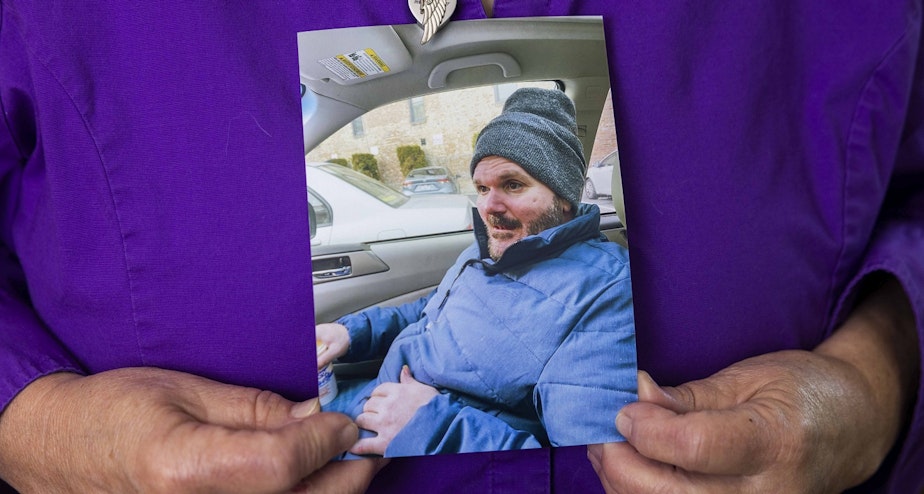A boy named Adam: When psychosis spills onto Seattle streets (Lost Patients podcast)

February 2023. Seattle.
Heidi Aurand stood behind her son Adam in a Seattle hotel room.
He sat on the bed, wearing a blue puffy coat and a gray beanie. He talked to the space in front of him, his face pinched in concentration.
“You do it every fucking way,” Adam, 40, said, “but it doesn't show that you're not fucking walking and you're carrying every bit of it.”
Who was he talking to? Heidi didn’t know. But she documented this moment on her phone because she didn’t know what else to do — and she wanted a record of her son not doing well.
In the video, Heidi is reflected in the mirror, watching her son. This was not the child she’d raised — a patient boy, the emotional rock of the family, gifted with a supernatural ability to fix broken toys and bikes.
Mental illness had claimed him in his 20s, as he stepped into adulthood, sending him cycling between emergency rooms, jail, and the streets. Along the way, doctors diagnosed him with schizophrenia, or schizoaffective disorder, or something else. Not that a diagnosis made things better.
On this day, in this hotel room, Adam was fresh from Washington state’s largest psychiatric hospital. He’d been dropped off at a homeless shelter in downtown Seattle. When Heidi got word, she drove from Portland, Oregon, to get him.
No one knows how many Adams there are on the streets of Seattle. A decade ago, policymakers estimated roughly 1,300 people.
This city has come to symbolize the mental illness crisis on our streets, adding to a feeling that U.S. cities have fallen into chaos and despair, and that something in our society has gone deeply, almost spiritually, off course.
All around the U.S. right now, mayors, governors, lawmakers, are scrambling to add hospital beds and pass laws that make it easier to institutionalize people against their will: reviving debates older than this country about when and how we should intervene when someone's so sick they don't know they're sick.
This is the first episode of “Lost Patients,” a collaboration between The Seattle Times and KUOW Public Radio, in partnership with the NPR Network.
Over six episodes, we tease apart the mental health system – showing why it’s so hard to get people through it all, into psychiatric care.
This episode was reported, written, and produced by Will James, Esmy Jimenez, and Sydney Brownstone. Liz Jones is the editor.
You can support “Lost Patients” by investing in the local newsrooms and the specialized beats that make this sort of storytelling possible. Please consider joining and subscribing at kuow.org and seattletimes.com.
Looking for mental health resources? KUOW compiled an "Acute mental health resource guide" that can help.






